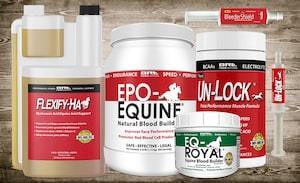
During the competition season, many owners and riders focus on keeping their horses sound, maintaining appropriate weight and ensuring they’re healthy enough to perform at their best. But gastric health often goes overlooked. That can be a mistake.
A competition schedule for a performance horse can take a toll on his gastric health. Frequent long-distance shipping trips, schedule disruptions and the stress of competing can all increase the chance of ulcers and experiencing other gastric issues, including colic. Luckily, you can manage your horse’s gastric health to keep him competition-ready all season long.
Adopt a Gastric-Friendly Feeding Plan
Your feeding plan can play a role in your horse’s gastric health. Try to provide your horse with continuous access to forage and minimize the amount of grain that you feed. This strategy helps to buffer your horse’s stomach against stomach acid, preventing ulcers from forming.
You may need to feed your horse large volumes of grain, but if that’s the case, try to break up feedings into multiple smaller meals throughout the day. This breaks the cycle of your horse eating a meal then waiting on an empty stomach until his next meal arrives.
Use Slow Feeders
Keeping hay in front of your horse all day is easier said than done, but using slow feeders can help to make each meal last. There are a variety of slow feeders available for purchase, but you can also put multiple hay nets inside each other to create a slow feeder of your own. Some horses learn to easily manipulate slow feeders, so you may need to experiment to find the solution that’s right for your horse.
Feed an Ulcer Preventive
Putting your horse on a daily ulcer preventive product can also help to keep ulcers at bay. Some vets are now recommending that you also feed your horse aloe vera juice to help soothe and coat their stomachs. Talk with your vet about your horse’s competition schedule and just which product they would recommend.
Monitor Behavior and Training Changes
Closely watch your horse for changes in his behavior or training progress. If your horse starts to buck under saddle, spooks more than normal, becomes hotter or more reactive than normal or turns in a lackluster performance, he could be developing ulcers. You may also notice that your horse goes off of his feed.
These issues could also be related to saddle fit, teeth that need to be floated, or pain elsewhere in your horse’s body. If you suspect that pain is prompting behavior or training changes in your horse, have your vet out to do a thorough examination. Your vet may decide to scope your horse to confirm the presence of gastric ulcers.
Minimize Stress
When competing your horse, try to minimize his stress as much as possible. While at competitions, try to feed him at the same time that you would when at home. Allowing your horse to travel and be stabled with a buddy can help to keep him reassured, and giving your horse plenty of time in turnout can also help reduce his stress. With less stress your horse will produce less stomach acid, making for a healthier gastric system.
Caring for your horse’s gastric health is an ongoing task, but with careful maintenance, you can help to keep him healthy even during the demands of a rigorous competition season.
Top trainers, owners and competitors rely on BRL Equine products to help their horses perform at their very best. You can get the same great results! Our all-natural equine nutritional supplements really work... guaranteed or your money back!





Also in Horse Tips and More
Top 10 Ways to Show Your Horse You’re Thankful For Him
November 01, 2021
View full article →
5 Ways to Prepare Your Barn For Summer
May 03, 2021
View full article →
Your New Spring Horse Health Checklist
March 12, 2021
View full article →